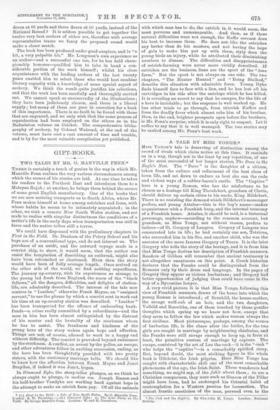GIFT-BOOKS.
TWO TALES BY MR. G. MANVILLE FENN.* THERE is certainly a touch of genius in the way in which Mr. Manville Fenn realises the very various circumstances among which the scenes of his stories are laid. At one time he takes his readers to the Furthest East and introduces them to a Malayan Rajah ; at another, he brings them behind the scenes of some great English manufactory. One of the books that we are now noticing transports us to South Africa, where Mr. Fenn makes himself at home among ostriches and lions, with whose habits he seems to be intimately acquainted ; in the other, we visit a remote New South Wales station, and are made to realise with singular distinctness the conditions of a 'Settler's life in the early days when transportation was still in force and the native tribes still a terror.
We could have dispensed with the preliminary chapters in First in the Field. Dr. Dunham of the Priory School and his boys are of a conventional type, and do not interest us. The purchase of an outfit, and the outward voyage made in a convict ship, to show, it would seem, that the author can resist the temptation of describing an outbreak, might also have been retrenched or shortened. Even then the story would have been of fully average length. Once arrived on the other side of the world, we find nothing superfluous. The journey up-country, with its experiences so strange to the young lad fresh from England, the scare of the "black fellows," all the dangers, difficulties, and delights of station- life, are admirably described. The interest of the tale now centres in "Leather," otherwise Frank Mayne, an "assigned servant," to use the phrase by which a convict sent to work out his time at an up-country station was described. " Leather " has been transported for the offence of embezzling bank- fands—a crime really committed by a subordinate—and the man in. him has been almost extinguished by the distrust of his master and the brutality of the stockman whom he has to assist. The frankness and kindness of the young hero of the story waken again hope and affection. Things are not, of course, allowed to work to a happy end without difficulty. The convict is provoked beyond endurance by the stockman. A conflict, an arrest by the police, an escape, and other adventures follow in exciting succession, ending, as the hero has been thoughtfully provided with two pretty sisters, with the customary marriage bells. We should like to know how the affection between Frank Mayne and Janet Braydon, if indeed it was Janet, began.
In Diamond Dyke, the story-teller plunges, as we think he always ought to plunge, in medics res. Joseph Emson and his half-brother Vandyke are working hard against hope in the attempt to make an ostrich farm pay. Of all the animals • (1,) First in the Field : a Tale of Now South Wales. By G. Manville peen Lladon : S. W. Partri5ge.—(2.) Diamond Dyke; or, Tito Lone Farm on the Veldt. By George Manvilto Penn. London: W. and R. 0 hambere. with which man has to do, the ostrich is, it would seem, the most perverse and unmanageable. And then, as if these natural difficulties were not enough, the Kaffir servant does his best to increase them. He does not like the ostriches any better than do his masters, and not having the hope of gain to make him put up with them, slyly does the young birds an injury, while he attributed their diminishing numbers to disease. The difficulties and disappointments of ostrich-farming were never more vividly described. If ostriches are the business, lions are the sport of the "lone farm." But the sport is not always on one side. The two chapters, "The Hunter Hunted" and "Being Stalked," describe this situation with admirable force. Young Dyke finds himself face to face with a lion, and he has lost all his cartridges in his ride after the antelope which he has killed. It is revealing no secret to say that he escapes, for the life of a hero is inviolable ; but the suspense is well worked up. He has other trials to go through, from thievish Kaffirs and from the deadly fever which almost robs him of his brother. How, in the end, brighter prospects open before the brothers, is Mr. Penn's surprise, which it is only right to respect. Let it suffice to say that it is well managed. The two stories may be ranked among Mr. Fenn's best work.


















































 Previous page
Previous page